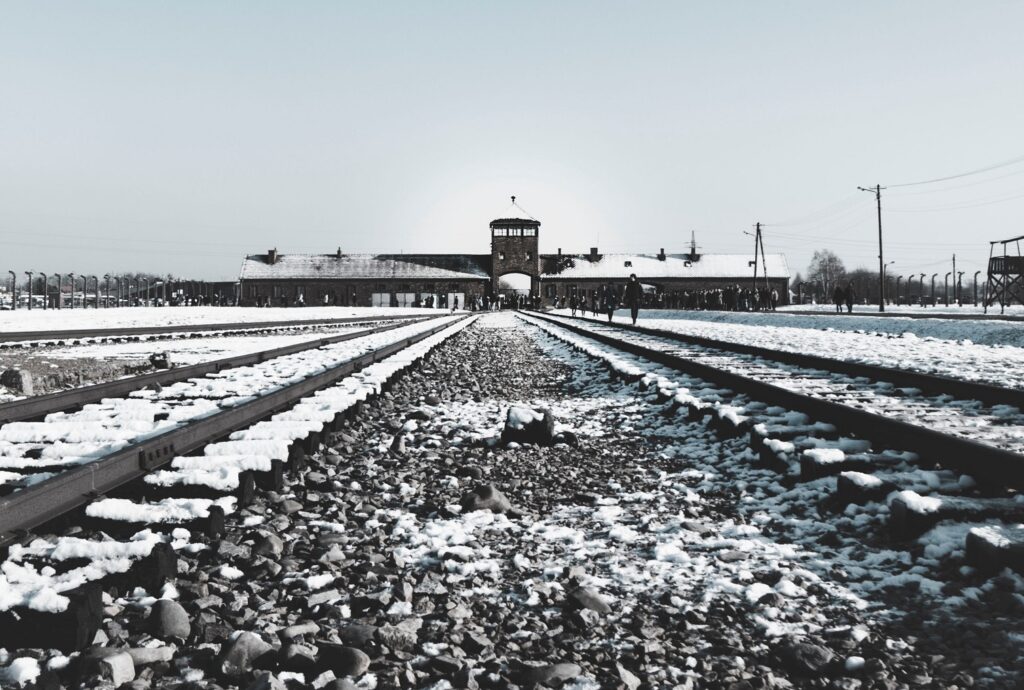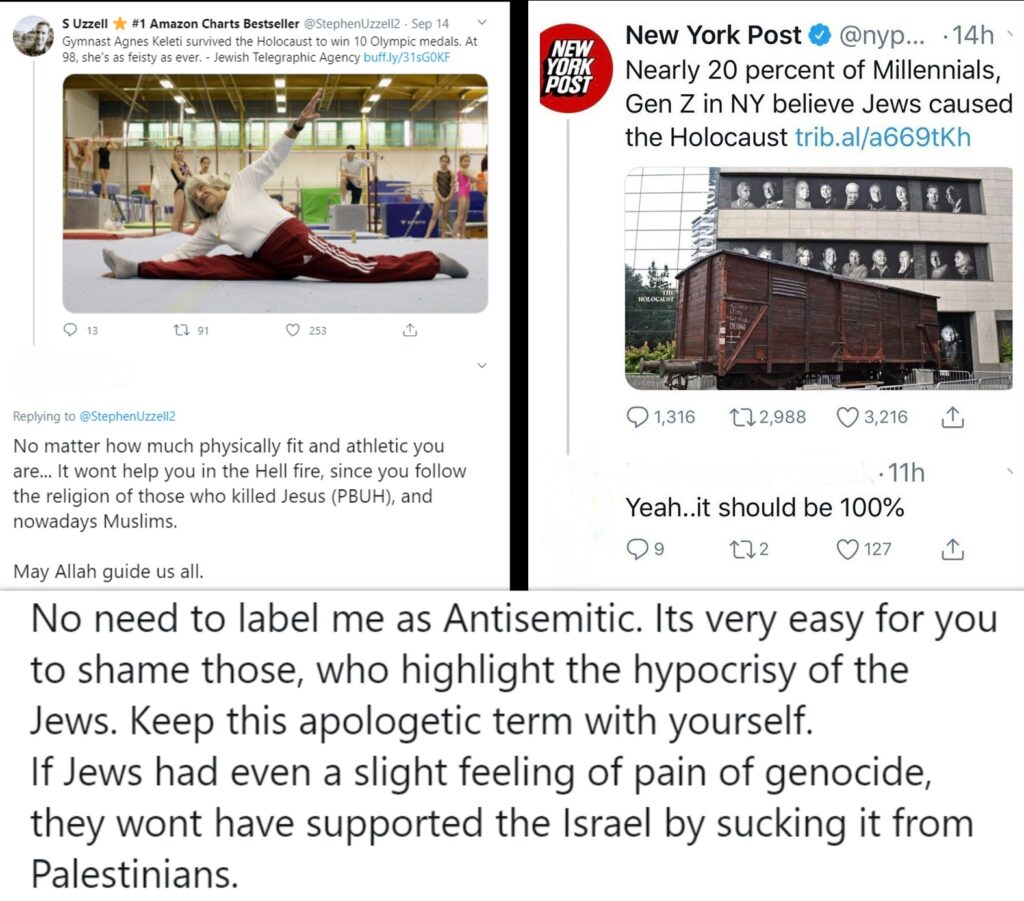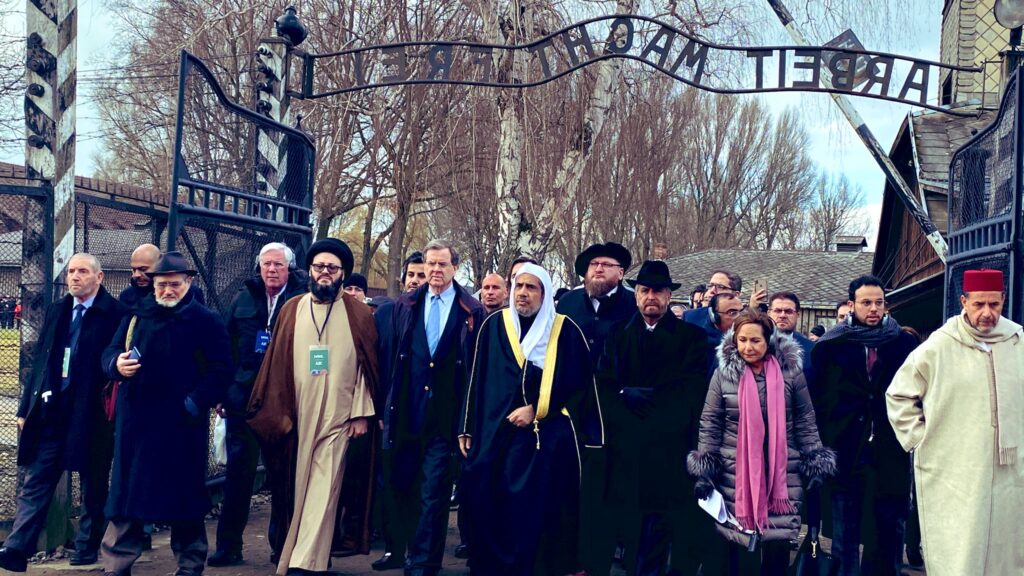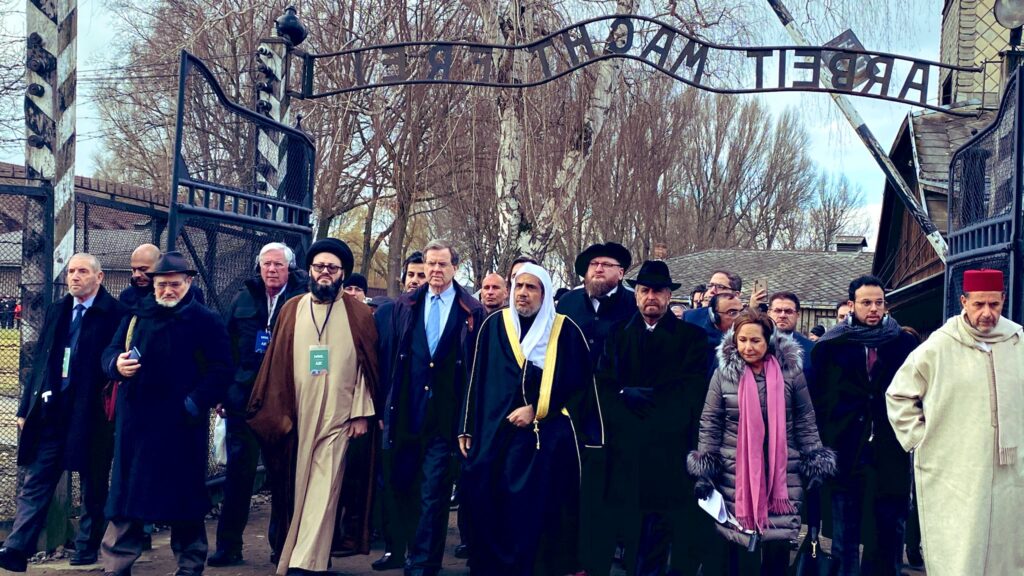[By Elizabeth Arif-Fear, Trustee (MAAS)]
Just when we think things couldn’t get any more shocking when it comes to antisemitism, a recent survey came out, with once again disheartening results.
Commissioned by the Conference on Jewish Material Claims Against Germany (Claims Conference), the research looked into the views of millennial and Generation X adults’ (aged 18 and 35) in the USA surrounding the Holocaust.
The results revealed some disturbing realities and the need for great change when it comes to antisemitism and young people’s understanding of the Holocaust.
What realities specifically you may ask? Well, a staggering level of Holocaust denial and lack of awareness around the genocide itself.
Through the survey, researchers discovered that:
- Almost half (48%) of those asked believed that the Holocaust was a “myth”, “had been exaggerated” or “weren’t sure”
- 1 out of 8 respondents (12%) didn’t know (or thought they didn’t know) about the Holocaust
It quite frankly beggars belief that such a large percentage of the young people interviewed knew about or actively denied the biggest genocide in history.
And again, what such results show is just how important education on antisemitism and Jewish history is, as well as the need to actively campaigning against hate. For whilst this may be over the pond, here in the UK; we’re in exactly the same boat.
Holocaust denial in the UK: A sad reality

The Vernichtungslager (extermination camp) at Auschwitz-Birkenau, Poland.
Just last year, a poll carried out for Holocaust Memorial Day Trust revealed that 5% of adults in the UK believe that the Holocaust did not take place.
If that wasn’t enough, it was also revealed that 1 in 12 believe that the scale of the Shoah has been exaggerated.
Not so different from the USA then it seems….
Even more shocking is that just one year after the UK-based poll, we marked the 75th anniversary of the liberation of Auschwitz-Birkenau and commemorated as we do annually, the horrors of the Holocaust.
Such stark reminders should stand was a warning and clear message to non-Jews of just how serious antisemitism was and is, and how far hatred can lead.
However, we’re sadly seeing that for some people the Holocaust is seemingly nothing more than an ‘exaggerated myth’ (referred to as the “Holohaux”) – supposedly ‘used by Jews’ to ‘harbour sympathy for Israel’.
This, of course, is not only antisemitic and false in itself, but builds on age-old antisemitic tropes of power, money, lies and influence that have plagued Jewish communities for millennia.
Not only is this deeply hurtful and disrespectful to those who sadly died and those who thankfully survived the Holocaust and the subsequent generations, but it’s also incredibly dangerous.
Such behaviour demonises a group of people as ‘liars’, as ‘dishonest’ and ‘disingenuous’. As ‘people who can’t be trusted’ who are ‘malicious’ and essentially ‘not one of us’ (a.k.a. ‘an unwanted other’).
Yes, it’s these racist tropes that have not only hurt Jews psychologically, socially, culturally, financially and politically in day-to-day life for centuries, but also have incited hatred and violence, eventually led to the Holocaust itself.
75 years on from the liberation of Auschwitz-Birkenau, what we crucially must remember is that when we forget the horrors of the Holocaust, we forget the suffering of an entire people.
We forget how far demonising, negative stereotyping and racist tropes can go. And we forget the need to acknowledge understand, remember and commit to #NeverAgain truly meaning never again.
In truth: when we let antisemitism fester, we lose sight of the past, the present and the future. And in particular with so much tension around the Israeli-Palestinian conflict, we also forget the role of Israel as a safe home for the Jewish people.
For Jewish families and communities here in the UK and worldwide, what this is all translates to is: life for Jewish people becoming harder, social cohesion diminishing and the risk of the horrors of persecution and genocide happening all over again sadly increasing too.
Let’s not be complacent. Such atrocities have taken place since the Holocaust – again and again, in Bosnia, Cambodia and Rwanda in the same very century. Already members of the British Jewish community have fled the UK to escape the increasing tide of antisemitism.
Antisemitism in the Muslim community: Acknowledging a problem

Antisemitic tweets by a Muslim Twitter user (September 2020).
Given the results of such surveys, we must see the wider picture. It’s crucial that we do not underestimate the significance of Holocaust Denial in any context.
For whilst the results of both surveys focus on Holocaust denial itself, they’re not an anomaly. Holocaust Denial itself feeds of antisemitic tropes of power and control. And likewise, we’ve seen how these attitudes are part of a wider worrying trend.
Here in the UK – and further afield – we’re not only seeing such shocking levels of Holocaust Denial but also increasing levels of antisemitism across the board.
We’re witnessing antisemitic tropes and conspiracy theories related to Covid-19 spreading across platforms such as Twitter, TikTok, Facebook and Instagram blaming Jews for the pandemic, slavery and all sorts of ills.
We’re witnessing attacks on our streets and the desecration of Jewish property. And most tragically of all, we’ve also all mourned the tragic loss of lives in Halle (Germany), Pittsburgh (USA) and at the kosher supermarket shooting in Paris in recent years as synagogues and Jewish businesses have been attacked by violent extremists.
Enough is enough. We must tackle antisemitism head-on. And this starts with identifying the source(s).
From both ends of the political spectrum (the Far-Left and the Far-Right), we sadly all know: that has not and does not exclude the Muslim community.
Findings by the Community Security Trust and The Institute for Jewish Policy Research back in 2017 revealed that the prevalence of antisemitism was most worrying among Christians, Muslims, the Far Left and the Far Right –with Muslims particularly affected:
“…the most concern exists about Muslims and the far-left; it is considerably less pronounced about Christians and the far-right.” (2017 report)
Within the Muslim community itself, the prominent anti-Zionist journalist Mendi Hassan himself acknowledged the scale of the issue:
“At home British Muslim attitudes are defined not just by denial but by indifference.
Few Muslims or mosques take part in the memorial day. In 2006 a Channel 4 poll found that a quarter of British Muslims didn’t know what the Holocaust was and only one in three believed it had occurred. This is scandalous. “
To be clear, this isn’t just at a grassroots level either…
In previous years, British Muslim leaders boycotted Holocaust Memorial Day believing the title of the day to be “non-inclusive” (of other atrocities) and additionally adding the Israeli-Palestinian conflict to the mix. With such worrying attitudes, it’s no wonder that there is so much misinformation and dis-engagement with Holocaust education and remembrance.
Now several years on, with the boycott lifted, things have improved. However, not nearly enough.
Just this week, since the recent research poll in the USA come out, I myself witnessed a series of antisemitic tweets from a Muslim man, with no sense of shame or wrongdoing.
Combining Holocaust Denial, blood libel, and anti-Zionism in direct response to both the poll and the joyous news that a Holocaust survivor had won an Olympic gold medal (see images above), the tweeter was not even moved by the accusations of antisemitism that stood against him. No, instead his response was that of a loud and proud antisemite.
The very fact that someone would scream such abuse towards a Holocaust survivor, in the context of raising awareness of the Holocaust and involving what is a very complex geo-political conflict in Israel-Palestine, shows just how bad the problem is and much work we’ve got to do.
Racist tropes, conspiracy theories, Holocaust denial and misinformation about the Israeli-Palestinian conflict are not uncommon and as Muslims: we need to change this.
Moving forward: Our commitment to fighting antisemitism
 A delegation of imams – led by Sheikh Muhammad al-Issa – with Jewish colleagues on a visit to Auschwitz concentration camp (January 2020).
A delegation of imams – led by Sheikh Muhammad al-Issa – with Jewish colleagues on a visit to Auschwitz concentration camp (January 2020).
It’s not easy, but here at MAAS, we’ve taken on the challenge and we’re ready to see it through.
There is a problem of antisemitism in the Muslim community and that’s exactly why MAAS was created. We’re here to call it out, to dispel myths, to educate and to build greater links between the Jewish and Muslim communities – as well as engage with policy and decision-makers.
As Muslims, we can, we must and will fight this vile form of hatred which continues to plague our communities and wider society. From Holocaust denial, to blood libel, to racist tropes – wherever, whenever and in whatever form antisemitism takes, we’re here to fight it.
So, as the Jewish New Year looms in, to our Jewish brothers and sisters, we’d like to wish you a wonderful sweet year ahead.
We’re here loud and proud re-affirming our commitment to stand with you in the fight against antisemitism. We will never give up.
And to the antisemites in our community, we have one message: we’ll keep fighting against antisemitism. There is no place to hide. Change is slowly building, dialogue is growing and we aim to see this through.
We urge all Muslims to join us. After all: you’re either part of the problem or part of the solution…
Shanah Tovah! Happy Rosh Hashanah!


You must be logged in to post a comment.